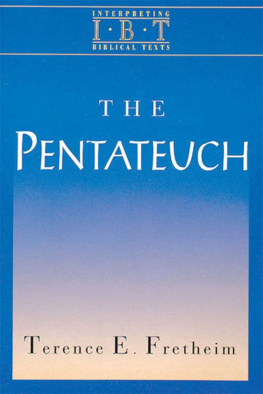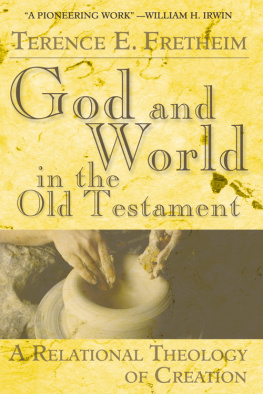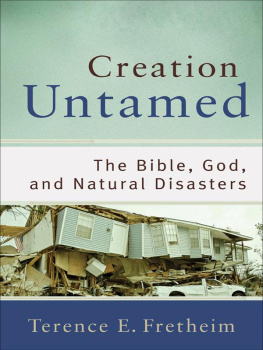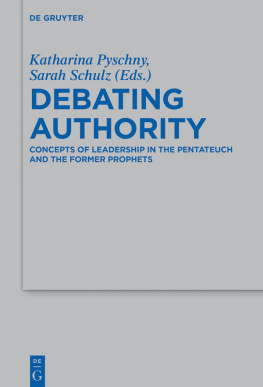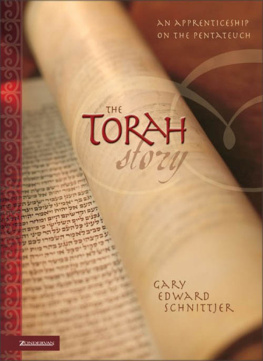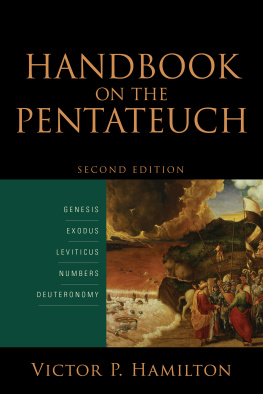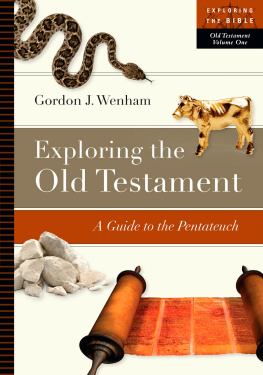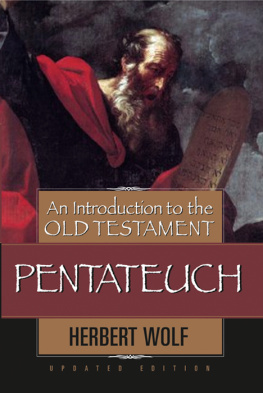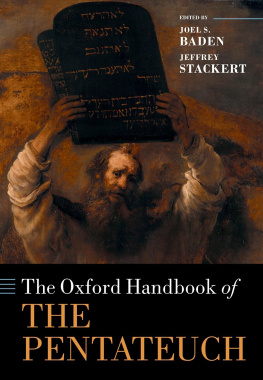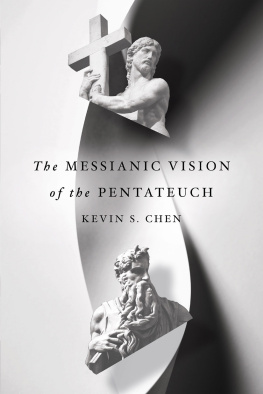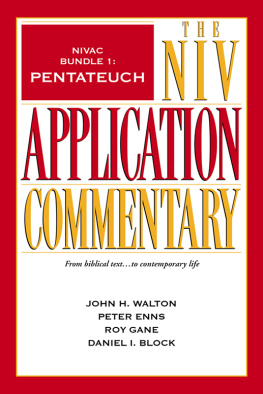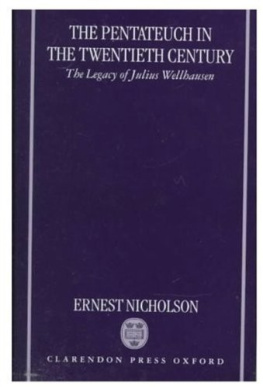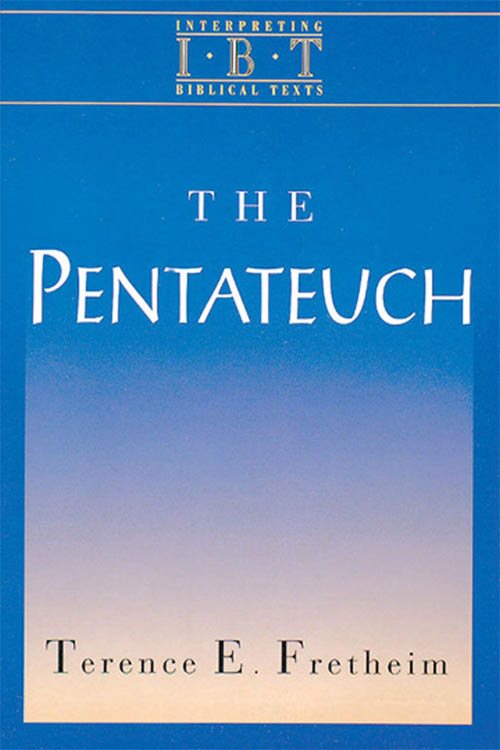Gene M. Tucker, Old Testament
Charles B. Cousar, New Testament
THE
P ENTATEUCH
Terence E. Fretheim
ABINGDON PRESS
Nashville
THE PENTATEUCH
Copyright 1996 by Abingdon Press
All rights reserved.
No part of this work may be reproduced or transmitted in any form or by any means, electronic or mechanical, including photocopying and recording, or by means of any information storage or retrieval system, except as may be expressly permitted by the 1976 Copy right Act or in writing from the publisher. Requests for permission should be addressed in writing to Abingdon Press, 201 Eighth Avenue South, Nashville, TN 37203.
This book is printed on recycled, acid-free, elemental-chlorinefree paper.
Library of Congress Cataloging-in-Publication Data
Fretheim, Terence E.
The Pentateuch / Terence E. Fretheim.
p. cm. (Interpreting Biblical texts)
Includes bibliographical references and index.
ISBN 0-687-00842-5 (alk. paper)
1. Bible. O.T. PentateuchCriticism, interpretation, etc.
I. Title. II. Series.
BS1225.2.F74 1996
222'.106dc20
96-33533
CIP
Scripture quotations, unless otherwise indicated, are from the New Revised Standard Version Bible, copyright 1989, by the Division of Christian Education of the National Council of the Churches of Christ in the United States of America.
Scripture quotations noted RSV are from the Revised Standard Version of the Bible, copyright 1946, 1952, 1971 by the Division of Christian Education of the National Council of Churches of Christ in the USA. Used by permission.
96 97 98 99 00 01 02 03 04 05 10 9 8 7 6 5 4 3 2 1
MANUFACTURED IN THE UNITED STATES OF AMERICA
To my mother and father
______________________
from whom I first learned these stories
Contents
Foreword
B iblical texts create worlds of meaning, and invite readers to enter them. When readers enter such textual worlds, which are often strange and complex, they are confronted with theological claims. With this in mind, the purpose of this series is to help serious readers in their experience of reading and interpreting, to provide guides for their journeys into textual worlds. The controlling perspective is expressed in the operative word of the titleinterpreting. The primary focus of the series is not so much on the world behind the texts or out of which the texts have arisen (though these worlds are not irrelevant) as on the world created by the texts in their engagement with readers.
Each volume addresses two questions. First, What are the critical issues of interpretation that have emerged in the recent history of scholarship and to which serious readers of the texts need to be sensitive? Some of the concerns of scholars are interesting and significant but, frankly, peripheral to the interpretive task. Others are more central. How they are addressed influences decisions readers make in the process of interpretation. Thus the authors call attention to these basic issues and indicate their significance for interpretation.
Second, in struggling with particular passages or sections of material, how can readers be kept aware of the larger world created by the text as a whole? How can they both see the forest and examine individual trees? How can students encountering the story of David and Bathsheba in 2 Samuel 11 read it in light of its context in the larger story, the Deuteronomistic History that includes the books of Deuteronomy through 2 Kings? How can readers of Galatians fit what they learn into the theological coherence and polarities of the larger perspective drawn from all the letters of Paul? Thus each volume provides an overview of the literature as a whole.
The aim of the series is clearly pedagogical. The authors offer their own understanding of the issues and texts, but are more concerned about guiding the reader than engaging in debates with other scholars. The series is meant to serve as a resource, alongside other resources such as commentaries and specialized studies, to aid students in the exciting and often risky venture of interpreting biblical texts.
Gene M. Tucker
General Editor, Old Testament
Charles B. Cousar
General Editor, New Testament
Preface
T his volume is primarily concerned with introducing students to the Pentateuch in its canonical form. The long and complex history of its interpretation will influence what I say, of course, and in more ways than I realize. But my preeminent interest is to enable the student of the Pentateuch to come to know more fully the Pentateuch's basic content, not this theory or that.
I undertake this study out of an interest in the capacity of the Pentateuch to speak a word of/about God to modern readers. These texts speak a word of God in the sense that they are means by which God speaks words of judgment and grace to readers in every generation. Hence, I will be concerned about the rhetorical strategy of the Pentateuch, that is, those matters of style and content that are designed in such a way as to have a certain effect upon its readers. The most basic effect desired, I believe, is to shape the faith and life of the Pentateuch's readers. To use the language of Deut 6:2, "so that you and your children and your children's children may fear the LORD your God all the days of your life, and keep all his decrees and his commandments... so that your days may be long."
In the service of this desired effect, these texts also speak a word about God. To use the language of the foreword, they are designed to "create worlds of meaning, and invite readers to enter them. When readers enter such textual worlds... they are confronted with theological claims." This means that I will give special attention to the theology in the text, most particularly its claims about God.
To that end, two introductory chapters will introduce the reader to the study of the Pentateuch and will present a proposal for reading the Pentateuch in terms of its rhetorical strategy. The remaining five chapters will seek to discern how that strategy works itself out within each book of the Pentateuch, using somewhat different approaches in view of the nature of the texts.
Conversations with many individuals have helped prepare the way for this book. I wish to express my special appreciation to students in my Pentateuch classes at Luther Seminary for interacting with this material. I am grateful to the series editor, Gene Tucker, and to Beverly Stratton and Richard Nysse for reading portions of the manuscript and offering helpful suggestions for its improvement. I also wish to thank the administration and Board of Directors of Luther Seminary for granting me a leave of absence to complete this project.

